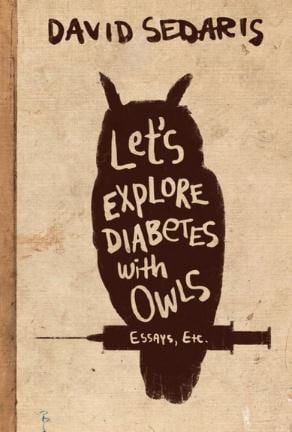In a recent interview with the CBC’s Eleanor Wachtel, the writer and social critic Fran Lebowitz mused – as only she can – that Lebowitz herself is to “blame” for the glut of comic essayists who appeared in her wake. With the possible exception of Dorothy Parker, a woman Lebowitz is constantly compared to, Lebowitz might just be the master of the short comic essay form. When Wachtel asked Lebowitz if she should also be “blamed” for the rise of David Sedaris, Lebowitz expressed admiration for the author. As for the aforementioned glut of lesser contemporary imitators? Says Lebowitz, “You can blame them on David Sedaris.”
Comparisons notwithstanding, after such a prodigious output – nine books, articles in The New Yorker, and a recurring spot on NPR’s This American Life – one would assume Sedaris would be subject to the law of diminishing returns. His new collection, Let’s Explore Diabetes with Owls, proves that not only is Sedaris the exception to that rule, he seems to be the exception to just about every other literary rule, too.
Author Martin Amis declared a war on the literary cliché in his own essay collection, but Sedaris isn’t necessarily fighting the same battle: jokes about the German language sounding overtly angry? Check. Stories about hopelessly out of touch fathers? Check. Observational humour about the wackiness of everyday life? Check. Yet, Sedaris’s take on each is not only remarkably fresh, but also murderously funny; at this point in his career, Sedaris has gained such mastery over his craft that even his clichés are hilarious.
And hilarious is the least of it. The phrase “laugh out loud” has been rendered wholly meaningless by overuse, so the experience of actually engaging in this activity – vigorously and often – is something of a revelation, and Sedaris prompts it again and again. Chapter after chapter in Let’s Explore Diabetes with Owls is filled with self-lacerating stories of nostalgic romantic encounters and enough childhood trauma to rouse Augusten Burroughs’s empathy, and each is conveyed with one-liners worthy of Lebowitz, with heart displayed openly on sleeve.
Sedaris also includes what he refers to as “six brief monologues that young people might deliver before a panel of judges,” which serve as savagely ironic attacks against ignorance and bigotry in contemporary American life. These are considerably less funny than the rest of his material, and their satire feels a bit obvious, but that is a minor quibble.
As in previous efforts, Sedaris’s long-time partner, Hugh, is a constant supporting player, and the mutual affection Sedaris describes is always palpable. One through-line in Owls seems to be Sedaris’s reflections on love and the place it holds in the lives of gay men of his generation. As a larger societal metaphor – especially coming from Sedaris, who escaped the mundane alienation of small-town American life and found lasting love – one can instantly relate to it. However, Sedaris’s comic-emotional landscape is far from pat, and he always offers complexity in his observations on life and love.
Surely this is a part of the reason Sedaris inspires such devotion in his legion of fans. Anyone who attended the author’s recent stand at the Sony Centre in Toronto was witness to the personal connection Sedaris shares with his public. The hundreds who waited hours in the lineup for the post-show book signing were each rewarded with a personal moment with Sedaris, who graciously spoke to each patron before writing mostly off-colour, always irreverently hilarious, messages in their books. Incidentally, the pleasure of reading Sedaris at home tends to increase after hearing him read aloud because, afterward, his inimitable diction and rhythms tend to be easily recreated in the reader’s mind.
With Let’s Explore Diabetes with Owls David Sedaris proves to be as biting, fresh and funny as ever – all praise be to Lebowitz.


 Why you can trust Xtra
Why you can trust Xtra


